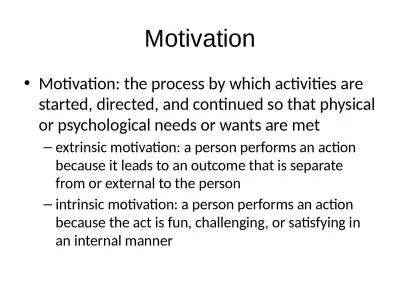PPT-MOTIVATION AND ENTREPRENEURSHIP DEVELOPMENT
Author : reagan | Published Date : 2022-06-28
ENTREPRENEURSHIP DEVELOPMENT AND INDUSTRIAL CONSULTANCY DBM421 Introduction Motive refers to drive and motivation means drive to achieve a goal Motivation refers
Presentation Embed Code
Download Presentation
Download Presentation The PPT/PDF document "MOTIVATION AND ENTREPRENEURSHIP DEVELOPM..." is the property of its rightful owner. Permission is granted to download and print the materials on this website for personal, non-commercial use only, and to display it on your personal computer provided you do not modify the materials and that you retain all copyright notices contained in the materials. By downloading content from our website, you accept the terms of this agreement.
MOTIVATION AND ENTREPRENEURSHIP DEVELOPMENT: Transcript
Download Rules Of Document
"MOTIVATION AND ENTREPRENEURSHIP DEVELOPMENT"The content belongs to its owner. You may download and print it for personal use, without modification, and keep all copyright notices. By downloading, you agree to these terms.
Related Documents














